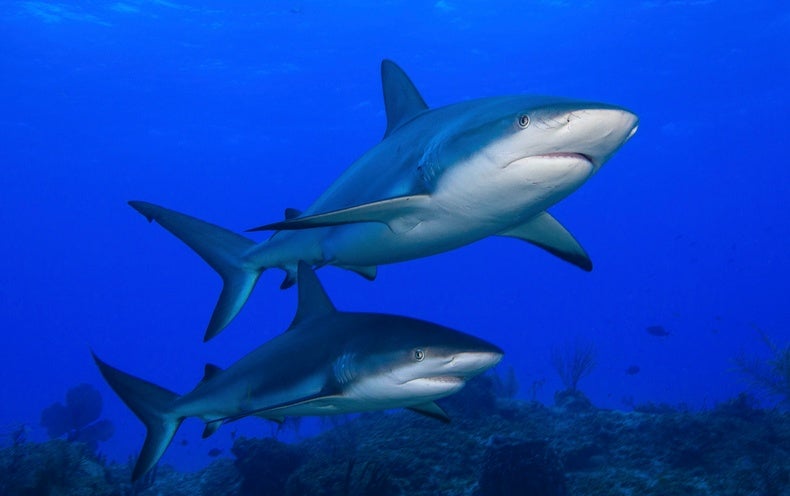Sharks have long inspired our fascination and our fear. However, a growing body of scientific evidence has shown that instead of being afraid of sharks—which have killed fewer humans within a year than such risks as accidents taking scenic selfies and encounters with vending machines—we should be afraid for sharks. The latest numbers from the International Union for Conservation of Nature’s Red List show that nearly one third of all known species of sharks and their relatives are considered threatened with extinction. This is one of the highest rates of any vertebrate group. And since sharks play crucial roles in the marine and coastal ecosystems that billions of humans depend on for their livelihoods and food security, the task of conserving these amazing and misunderstood species should concern us all.
More people than ever before are aware of the shark conservation crisis and want to help, which is great news. However, many well-intentioned people often don’t know the true causes of—and solutions to—this crisis, resulting in what’s at best wasted effort, and at worst harming what they’re trying to support. This conservation dilemma has inspired the last decade of my research and public science engagement. It also inspired my new book, Why Sharks Matter: A Deep Dive with the World’s Most Misunderstood Predator, which synthesizes hundreds of research papers and reports to inform readers of the true threats to sharks and how we can begin to solve them. Only by following the evidence and seeking data-driven, sustainable solutions to overfishing can we save these fascinating and important creatures.
Many people believe that the largest or only threat to sharks is “shark finning”: the practice of catching sharks, harvesting their fins and discarding the carcasses at sea. But this isn’t the case and hasn’t been for decades. I’ve seen some online petitions calling for bans on shark finning within Florida waters get tens of thousands of signatures. Apparently neither the petition creators nor the many signatories are aware that we already banned shark finning across the United States almost 30 years ago. While supporters of these petitions say that they’re “raising awareness,” it does not help anyone or anything to share incorrect information about what the problems are or how to solve them. Such feel-good solutions do nothing while diverting energy, media coverage and funding away from solutions that might really help.
The greatest threat facing sharks—contrary to viral campaigns I’ve seen from well-meaning but uninformed supporters of shark conservation—is not climate change, which may negatively affect some populations, nor plastic pollution, which may harm some individuals but is not a species-level threat. We should absolutely work to address these two as well as myriad other ocean conservation issues, but claiming that doing so is vital to shark conservation is at best misleading.
In reality, the top threat to sharks and their relatives, by far, is unsustainable overfishing, which includes, but is not limited to, shark finning. One hundred percent of the shark species considered threatened with extinction by the IUCN Red List, include overfishing among their threats; it’s no accident that the paper announcing Red List status updates is entitled “Overfishing drives over one-third of all sharks and rays toward a global extinction crisis.” The problem is that humans are killing too many sharks, whether accidentally through “bycatch,” when people fishing capture other species swimming near their fishing targets, or on purpose, either from finning, however small a percentage it may be, or because of a growing demand for shark meat. Banning or restricting the fin trade alone does little to address this much broader issue, and because there is no standardization in how numbers of accidentally killed sharks are reported, we still don’t really know the depth of the problem.
Notably, this does not mean that the only solution is “no fishing allowed ever.” Sustainable fisheries for sharks absolutely exist and are a vital part of livelihoods and food security in developing nations in the Global South. Sharks have relatively few offspring relatively infrequently, which complicates fisheries management, but the principle is the same as for any sustainable fishery: perform scientific research to learn how many sharks are present, and allow fishermen to take some of them (but not so many that the population collapses). In fact, 90 percent of surveyed shark scientists and 78 percent of surveyed shark conservation advocates prefer sustainable shark fisheries to total bans on fishing for sharks and trade in shark products!
If you’ve never heard about sustainable shark fisheries before but have heard that the best way to save sharks is by banning the U.S. fin trade, it’s probably because, for reasons that aren’t very clear, such bans get much, much more media attention than science-based sustainable fisheries management. Many people are also influenced by provocative and misleading (to put it mildly) “documentaries” like 2021’s Seaspiracy.
There’s no doubt that sharks need our help, and that the loss of sharks would be ecologically and economically devastating. But we must focus our efforts on the real threats, and we must use evidence-based solutions to alleviate those threats.
If you want to learn more about the threats to sharks and the solutions backed by expert scientists and scientific evidence, I invite you to pick up a copy of Why Sharks Matter: A Deep Dive with the World’s Most Misunderstood Predator.
































